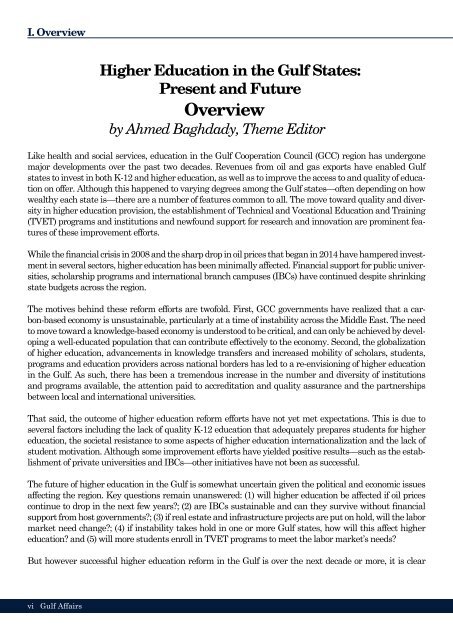in the Gulf States
gulf_affairs_spring_2017_full_issue
gulf_affairs_spring_2017_full_issue
You also want an ePaper? Increase the reach of your titles
YUMPU automatically turns print PDFs into web optimized ePapers that Google loves.
I. Overview<br />
Higher Education <strong>in</strong> <strong>the</strong> <strong>Gulf</strong> <strong>States</strong>:<br />
Present and Future<br />
Overview<br />
by Ahmed Baghdady, Theme Editor<br />
Like health and social services, education <strong>in</strong> <strong>the</strong> <strong>Gulf</strong> Cooperation Council (GCC) region has undergone<br />
major developments over <strong>the</strong> past two decades. Revenues from oil and gas exports have enabled <strong>Gulf</strong><br />
states to <strong>in</strong>vest <strong>in</strong> both K-12 and higher education, as well as to improve <strong>the</strong> access to and quality of education<br />
on offer. Although this happened to vary<strong>in</strong>g degrees among <strong>the</strong> <strong>Gulf</strong> states—often depend<strong>in</strong>g on how<br />
wealthy each state is—<strong>the</strong>re are a number of features common to all. The move toward quality and diversity<br />
<strong>in</strong> higher education provision, <strong>the</strong> establishment of Technical and Vocational Education and Tra<strong>in</strong><strong>in</strong>g<br />
(TVET) programs and <strong>in</strong>stitutions and newfound support for research and <strong>in</strong>novation are prom<strong>in</strong>ent features<br />
of <strong>the</strong>se improvement efforts.<br />
While <strong>the</strong> f<strong>in</strong>ancial crisis <strong>in</strong> 2008 and <strong>the</strong> sharp drop <strong>in</strong> oil prices that began <strong>in</strong> 2014 have hampered <strong>in</strong>vestment<br />
<strong>in</strong> several sectors, higher education has been m<strong>in</strong>imally affected. F<strong>in</strong>ancial support for public universities,<br />
scholarship programs and <strong>in</strong>ternational branch campuses (IBCs) have cont<strong>in</strong>ued despite shr<strong>in</strong>k<strong>in</strong>g<br />
state budgets across <strong>the</strong> region.<br />
The motives beh<strong>in</strong>d <strong>the</strong>se reform efforts are twofold. First, GCC governments have realized that a carbon-based<br />
economy is unsusta<strong>in</strong>able, particularly at a time of <strong>in</strong>stability across <strong>the</strong> Middle East. The need<br />
to move toward a knowledge-based economy is understood to be critical, and can only be achieved by develop<strong>in</strong>g<br />
a well-educated population that can contribute effectively to <strong>the</strong> economy. Second, <strong>the</strong> globalization<br />
of higher education, advancements <strong>in</strong> knowledge transfers and <strong>in</strong>creased mobility of scholars, students,<br />
programs and education providers across national borders has led to a re-envision<strong>in</strong>g of higher education<br />
<strong>in</strong> <strong>the</strong> <strong>Gulf</strong>. As such, <strong>the</strong>re has been a tremendous <strong>in</strong>crease <strong>in</strong> <strong>the</strong> number and diversity of <strong>in</strong>stitutions<br />
and programs available, <strong>the</strong> attention paid to accreditation and quality assurance and <strong>the</strong> partnerships<br />
between local and <strong>in</strong>ternational universities.<br />
That said, <strong>the</strong> outcome of higher education reform efforts have not yet met expectations. This is due to<br />
several factors <strong>in</strong>clud<strong>in</strong>g <strong>the</strong> lack of quality K-12 education that adequately prepares students for higher<br />
education, <strong>the</strong> societal resistance to some aspects of higher education <strong>in</strong>ternationalization and <strong>the</strong> lack of<br />
student motivation. Although some improvement efforts have yielded positive results—such as <strong>the</strong> establishment<br />
of private universities and IBCs—o<strong>the</strong>r <strong>in</strong>itiatives have not been as successful.<br />
The future of higher education <strong>in</strong> <strong>the</strong> <strong>Gulf</strong> is somewhat uncerta<strong>in</strong> given <strong>the</strong> political and economic issues<br />
affect<strong>in</strong>g <strong>the</strong> region. Key questions rema<strong>in</strong> unanswered: (1) will higher education be affected if oil prices<br />
cont<strong>in</strong>ue to drop <strong>in</strong> <strong>the</strong> next few years?; (2) are IBCs susta<strong>in</strong>able and can <strong>the</strong>y survive without f<strong>in</strong>ancial<br />
support from host governments?; (3) if real estate and <strong>in</strong>frastructure projects are put on hold, will <strong>the</strong> labor<br />
market need change?; (4) if <strong>in</strong>stability takes hold <strong>in</strong> one or more <strong>Gulf</strong> states, how will this affect higher<br />
education? and (5) will more students enroll <strong>in</strong> TVET programs to meet <strong>the</strong> labor market’s needs?<br />
But however successful higher education reform <strong>in</strong> <strong>the</strong> <strong>Gulf</strong> is over <strong>the</strong> next decade or more, it is clear<br />
vi <strong>Gulf</strong> Affairs


